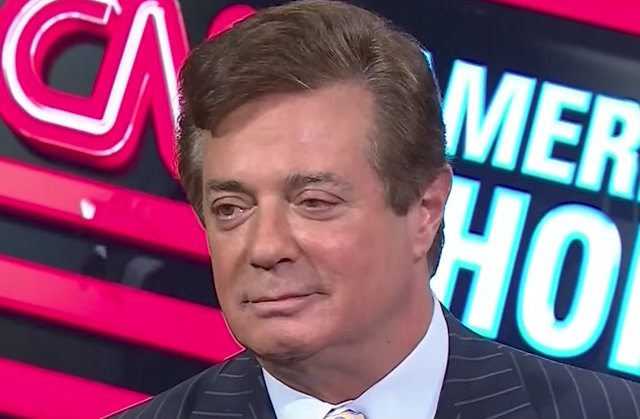
On Wednesday, former Trump campaign manager Paul Manafort sued the DOJ, Deputy Attorney General Rod Rosenstein, and Special Counsel Robert Mueller in a civil lawsuit. The point of the lawsuit? If we’re being honest, not much beyond exciting up conservatives with aggressive-sounding headlines. The Complaint, filed in federal court for the District of Columbia, requests “injunctive relief to restrict public officers to their lawful authority.” In other words, the Russia investigation has gone too far and Manafort is asking the court to order the DOJ to stand down.
Like many lawsuits filed for the purpose of getting a court to declare someone “correct,” this one is going nowhere. Manafort’s arguments ranged from the ridiculous to the passé, and none of them will amount to a do-over of his indictment. Here are the top three losers, straight from the lawsuit.
1.
What Manafort’s Complaint said, paraphrased: “Mueller was supposed to be investigating Russian collusion, not other stuff. I may have done all sorts of incredibly shady stuff, but it was totally separate from the 2016 election and Russia. Therefore, Mueller should have looked the other way, and now a court should dismiss my indictment.”
What the Court is probably going to say: “Sorry, Paul, it’s close enough for jazz.”
I’m always amused when criminals defend themselves by saying that they did commit wrongdoing, but that whoever is prosecuting them lacks the authority to do so. The Complaint characterizes the charges against Manafort as, “completely unmoored from the Special Counsel’s original jurisdiction,” which might make sense if Mueller’s investigation uncovered that Manafort had punched someone in a bar fight a decade ago; however, Manafort’s history of alleged lying to the FBI about interactions with Russian officials feels a lot like the entire reason Mueller was appointed in the first place. It’s true that much of what was uncovered against Manafort predated his work with the Trump campaign, but given the nature of the indictment against him, this argument lacks any real credibility. And it seems like everyone knows it:
While there certainly are limits to the scope of Robert Mueller’s authority, it’s beyond unlikely that any court would side with Manafort on this issue.
2.
What Manafort’s Complaint said, paraphrased: “If a court doesn’t put Mueller in his place now, Mueller is going to become an out-of-control super-villain.”
What the Court is probably going to say: “Been there, decided this, and Scalia is gone. Nice try, though.”
This argument is one that initially sounds reasonable, especially to anyone who remembers Kenneth Starr. I especially liked it when Manafort’s Complaint described limited government with much drama:
“The principle that government must be both limited in power and accountable to the people lies at the core of our constitutional traditions. That principle must be zealously guarded against creeping incursions. One of the most notorious violations—the “wolf” that famously came “as a wolf”—was the now-defunct independent counsel law from the Ethics in Government Act of 1978…”
The only problem is that the Supreme Court has already ruled on the whole independent counsel thing back in 1988, and found the idea of an independent prosecutor to be perfectly Constitutional. Sure, there may be policy reasons to object oppose the Independent Counsel Act, but not everything with which one disagrees is illegal. Legal scholars, such as national security expert Steve Vladeck, have been quick to point out that this argument is a loser:
In SCOTUS’ decision in Morrison v. Olson, Justice Scalia issued one of his famous dissents, in which he warned against an independent prosecutor, influenced by politics, wielding too much power. The arguments Scalia raised in dissent, somewhat prescient in the retrospectful context of Starr’s prosecution of Bill Clinton, did form the basis of Congress’ decision not to renew the Ethics in Government Act when it expired. However, the part which provided for the appointment of a special prosecutor (like Mueller) to investigate wrongdoing (like Russian collusion) is still alive and well – albeit it, under a different statutory heading. Given that SCOTUS specifically ruled in Morrison v. Olson that the independent counsel did not violate constitutional principles, what Manafort is asking would require an overruling of that case. While 2018 is certainly the time of “anything’s possible,” I’d file such an outcome under “not going to happen.”
3.
What Manafort’s Complaint said, paraphrased: “The DOJ already knew I’d committed crimes and sat on that info. Therefore, the indictment against me shouldn’t count.”
What the Court is probably going to say: “Umm, what? Yeah, that’s not how criminal law works. Like at all.”
Don’t take my word for it. Check out the actual words of the Complaint:
“Even if that grant of authority were lawful, Mr. Mueller’s investigation and the resulting indictment exceed it. The indictment raises stale allegations DOJ must have been aware of for nearly a decade; they are not matters that ‘arose . . . from the investigation” into the 2016 election and alleged collusion with the Russian government. By ignoring the boundaries of the jurisdiction granted to the Special Counsel in the Appointment Order, Mr. Mueller acted beyond the scope of his authority. Mr. Mueller’s actions must be set aside.’”
If only there were a legal concept that deals with the idea of the government waiting too long to charge someone with a crime. Oh wait. Right. We have “statutes of limitation.” Simply declaring that the Department of Justice “must have been aware” of something isn’t quite the same thing as arguing that a statute of limitation has been violated.
Losing argument aside, there’s also the procedural issue of who’d have to decide this case. Given the nature of the legal issues involved, this is one that would SCOTUS to take it on. And that’s not exactly likely to happen any time soon. We’ll keep you posted as this case makes its way through the courts, but we’re not expecting much.